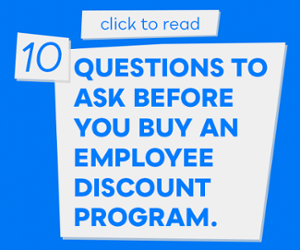What drives your business?
Most organizations operate under a Corporate Mission and corresponding Core Values. The mission explains WHAT the organization aims to do while the values spell out HOW they intend to accomplish it. These are usually defined by executives to inspire decisions and strategy within the company.
The company’s mission and values are fairly easy to communicate to employees as well as potential employees during the hiring process. And they’re important to candidates as they help describe the work that goes on inside the walls of the company.
But arguably even MORE consequential to attracting and retaining the right employees is the corporate culture.
What is Corporate Culture?
Culture isn’t quite as simple to define. Unlike the mission and values, culture develops organically and is made of underlying assumptions rather than penned in ink. It’s the result of the traits, values, attitudes and behaviors of all employees within the organization.
And its impact is huge. In fact, many reasons responsible for employee turnover tie back to culture. Things like benefits and perks, growth opportunity and management styles are among the top reasons employees quit a job. And according to a recent study, one-third of job seekers would pass up the perfect job if the corporate culture wasn’t a fit.
On top of losing out on the best workers, organizations lacking a strong culture are missing out on productivity. One survey found that 52% of employees think their internal office culture actually creates barriers to executing good ideas.
On the flip side, a positive corporate culture creates a better employee experience, which leads to a better customer experience and ultimately better business.
So how do organizations ensure a healthy culture?
How To Determine the Strength of a Company's Culture
As with most things, the best place to begin is with an assessment. Next, establish where your organization excels and which areas need improvement. Finally, develop a plan for implementing changes.
You can start by asking these 8 questions:
- Do employees feel like their input is valued? – Have you ever been asked for your feedback and then all but shunned when you offer it? Honest communication is vital to a healthy corporate culture. Too often, employees
 don’t speak up in fear of the repercussions that’ll follow if they share their sincere opinion. Employees need easy access to a manager and regular opportunities to share their candid feedback. Know-it-all leaders miss out on their own moments for growth when they squash employee feedback.
don’t speak up in fear of the repercussions that’ll follow if they share their sincere opinion. Employees need easy access to a manager and regular opportunities to share their candid feedback. Know-it-all leaders miss out on their own moments for growth when they squash employee feedback. - Do we enable professional growth? – It’s human nature to desire continual growth. That’s why it shouldn’t come as a surprise that professional development and career growth remains one of the top characteristics workers look for in an employer. Getting the right employees on board is a crucial first step but it’s not enough. Providing the freedom to progress professionally within the organization will increase the likelihood that they’ll stick around for the long haul.
- Do we provide the flexibility employees need for their personal life? – It’s back to the basics with this one but this simply can’t be overstated. Failing to acknowledge your employees have lives outside the office can be a costly mistake. Whether it’s providing remote work options, flexible schedules, ample PTO or other benefits employees need to make the most of their time off, cultivating a healthy work-life balance is key to a strong culture.
- Do employees feel like they are in control? – Most workers can only thrive in high-stress environments for a limited amount of time. Even when job duties involve a certain amount of stress or pressure, well-developed processes bring order that results in a manageable work space. A structured environment will allow workers to feel relaxed enough to make smart decisions and avoid feeling panicked even when unplanned issues arise.
- Do we encourage healthy employee relations? – Employees spend the better part of their week with co-workers. These relationships can often make or break productivity in the office. Teams where all members carry their share of the work load lead to the best company cultures. Incorporating regular team building functions can help facilitate robust relationships where workers are unified and supportive of one another.

- Do employees have stake in the company’s success? – This could mean employees have the ability to acquire stock in the company, but it doesn’t have to. Since everyone works for a paycheck, money is often the greatest motivator. Tying bonuses to individual, department or company-wide goals will help propel workers to achieve those objectives. Culture is improved when personal goals align with company objectives and workers feel compensated when they make progress.
- Do we support health and wellness? – Health initiatives have many benefits. One often unsung perk is that wellness programs can be a great way to build employee camaraderie. They provide opportunities for friendly competitions and fitness-related activities in and out of the office. Studies show that people who share wellness-related activities and goals with their peers are six times more likely to follow through on a program than those who don’t involve others. Sharing healthy goals with co-workers makes work a place one feels better personally in addition to professionally.
- Do we empower employees to go the extra mile for clients and customers? – This central piece of the puzzle is a critical “must” for employee engagement and a healthy corporate culture. First, training must be thorough so employees have total confidence in carrying out their job duties. Second, managers need to trust their employees and empower them to make decisions. Hiring workers that need constant supervision can quickly turn into a babysitting job and defeats the purpose of hiring that employee in the first place. Instead, bring on strong candidates that you trust to take care of customers as you would. Then step back, and let them do it.
The Short Path to a Better Corporate Culture
Truth be told, you’re probably already doing a lot of these things. Even so, there’s always room for improvement. If you’re feeling overwhelmed by oodles of great ideas running through your mind, pick one and start there. Even just the commitment to a great culture helps improve the vibe around the office. The tiniest bit of progress is still progress.
Ensure your work space only gets better over time by continually investing in the Corporate Culture. Your organization will reap the rewards of your thriving, engaged employees for years to come.
For other great tips on how to take care of your employees, read Why Employee Vacations Are SOOO Good For Business And How Employers Can Make Them Happen or A Simple Guide to Understanding and Creating Great Employee Experiences.







